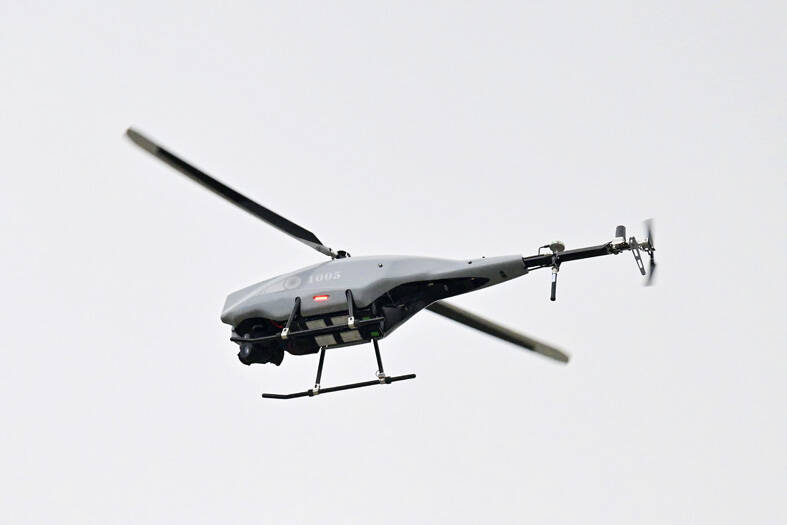The military plans to invest NT$6.89 billion (US$215.73 million) to purchase six types of drones to bolster the nation’s asymmetrical combat capabilities, the Ministry of National Defense said yesterday.
Three of the six types of drones fall under the categories “surveillance and reconnaissance,” “land-based surveillance and reconnaissance” and “ship-mounted surveillance and reconnaissance,” while the other three are micro-drones, including “target acquisition” and “tactical” drones, it said.
The ministry said it would acquire the surveillance and reconnaissance drones, while the land and ship drones would be purchased by the navy and the micro-drones would be purchased by the army.

Photo: Tu Chien-jung, Taipei Times
Procurement of the surveillance and reconnaissance drones and the navy’s ship-mounted drones is estimated to be completed before the end of next year, the ministry said.
The army hopes to obtain all three types of micro-drones by the end of September 2027, it said.
The navy’s land-based drones would be acquired over four years, with the last purchase expected to be made in October 2028, it said.
Taiwan UAV (智飛科技), Coretronic Robotics (中光電), MiTAC Information Technology Corp (神通資訊) and Evergreen Aviation Technologies Corp (EVGA, 長榮航太) obtained the bids for the drones, the ministry said.
Taiwan UAV would focus on the development of land-based reconnaissance and monitoring drones; EVGA would develop ship-based surveillance and reconnaissance drones; Coretronic would develop surveillance and reconnaissance, and micro-drones; and MiTAC would develop micro-drones, as well as a tactical micro-drone, it said.
The tactical micro-drone would cost an additional NT$1.19 billion, the ministry said.

AT RISK: The council reiterated that people should seriously consider the necessity of visiting China, after Beijing passed 22 guidelines to punish ‘die-hard’ separatists The Mainland Affairs Council (MAC) has since Jan. 1 last year received 65 petitions regarding Taiwanese who were interrogated or detained in China, MAC Minister Chiu Chui-cheng (邱垂正) said yesterday. Fifty-two either went missing or had their personal freedoms restricted, with some put in criminal detention, while 13 were interrogated and temporarily detained, he said in a radio interview. On June 21 last year, China announced 22 guidelines to punish “die-hard Taiwanese independence separatists,” allowing Chinese courts to try people in absentia. The guidelines are uncivilized and inhumane, allowing Beijing to seize assets and issue the death penalty, with no regard for potential

STILL COMMITTED: The US opposes any forced change to the ‘status quo’ in the Strait, but also does not seek conflict, US Secretary of State Marco Rubio said US President Donald Trump’s administration released US$5.3 billion in previously frozen foreign aid, including US$870 million in security exemptions for programs in Taiwan, a list of exemptions reviewed by Reuters showed. Trump ordered a 90-day pause on foreign aid shortly after taking office on Jan. 20, halting funding for everything from programs that fight starvation and deadly diseases to providing shelters for millions of displaced people across the globe. US Secretary of State Marco Rubio, who has said that all foreign assistance must align with Trump’s “America First” priorities, issued waivers late last month on military aid to Israel and Egypt, the

‘UNITED FRONT’ FRONTS: Barring contact with Huaqiao and Jinan universities is needed to stop China targeting Taiwanese students, the education minister said Taiwan has blacklisted two Chinese universities from conducting academic exchange programs in the nation after reports that the institutes are arms of Beijing’s United Front Work Department, Minister of Education Cheng Ying-yao (鄭英耀) said in an exclusive interview with the Chinese-language Liberty Times (the Taipei Times’ sister paper) published yesterday. China’s Huaqiao University in Xiamen and Quanzhou, as well as Jinan University in Guangzhou, which have 600 and 1,500 Taiwanese on their rolls respectively, are under direct control of the Chinese government’s political warfare branch, Cheng said, citing reports by national security officials. A comprehensive ban on Taiwanese institutions collaborating or

France’s nuclear-powered aircraft carrier and accompanying warships were in the Philippines yesterday after holding combat drills with Philippine forces in the disputed South China Sea in a show of firepower that would likely antagonize China. The Charles de Gaulle on Friday docked at Subic Bay, a former US naval base northwest of Manila, for a break after more than two months of deployment in the Indo-Pacific region. The French carrier engaged with security allies for contingency readiness and to promote regional security, including with Philippine forces, navy ships and fighter jets. They held anti-submarine warfare drills and aerial combat training on Friday in